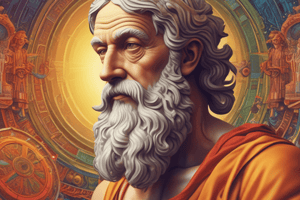Podcast
Questions and Answers
What is the Euthyphro Dilemma?
What is the Euthyphro Dilemma?
- Is what is morally good commanded by God because it is morally good?
- Both A and B (correct)
- Is what is morally good morally good because it is commanded by God?
- Neither A nor B
If option 1 of the Euthyphro Dilemma is correct, what does it imply about morally good acts?
If option 1 of the Euthyphro Dilemma is correct, what does it imply about morally good acts?
Morally good acts are good independent of God's will.
If God sets the standard of goodness, it is appropriate to praise him for being good.
If God sets the standard of goodness, it is appropriate to praise him for being good.
False (B)
How does Soren Kierkegaard respond to the Euthyphro dilemma?
How does Soren Kierkegaard respond to the Euthyphro dilemma?
What is Plato's conclusion regarding the Euthyphro dilemma?
What is Plato's conclusion regarding the Euthyphro dilemma?
What is Aquinas's perspective on the nature of God and morality?
What is Aquinas's perspective on the nature of God and morality?
Flashcards
Euthyphro Dilemma
Euthyphro Dilemma
Poses the question of whether moral goodness is commanded by God or exists independently.
Goodness Exists Independently
Goodness Exists Independently
Moral acts are independent of God's will, implying a higher moral standard.
Morality Defined by God
Morality Defined by God
Morality is defined solely by God's commands.
Kierkegaard's View
Kierkegaard's View
Signup and view all the flashcards
Plato's View
Plato's View
Signup and view all the flashcards
Aquinas' View
Aquinas' View
Signup and view all the flashcards
Study Notes
Euthyphro Dilemma Overview
- The Euthyphro Dilemma questions whether moral goodness is dictated by God or exists independently of divine command.
- Two main propositions arise from the dilemma:
- Is moral goodness commanded by God because it is inherently good?
- Or is moral goodness considered good simply because it is commanded by God?
Implications of Proposition 1
- If moral goodness exists independently of God, then moral acts do not rely on God's will, suggesting a higher moral standard.
- This perspective implies a limitation on God’s omnipotence, challenging the idea of God as the sole source of morality.
Implications of Proposition 2
- If morality is defined solely by God's commands, then praise towards God for His morality becomes questionable.
- God cannot fail to meet a standard He sets, rendering it inappropriate to laud Him for meeting it.
- With no pre-existing moral standards, God’s commands could become arbitrary, resulting in potential moral endorsement of actions like killing, challenging God's omnipotence or His worthiness of worship.
Soren Kierkegaard's Response
- Kierkegaard contends that whatever God commands should be regarded as good (aligning with Proposition 1).
- He acknowledges that God may issue commands that appear immoral (e.g., testing faith).
- Kierkegaard emphasizes the importance of faith in God’s moral intentions, trusting in a divine perspective that surpasses human understanding.
Plato's Response
- Plato supports the second proposition, asserting that goodness transcends both humans and gods.
- He believes in an independent existence of morality, implying that God or deities merely convey this truth rather than create it.
- This view suggests a limitation on God’s omnipotence while still recognizing a form of higher authority.
Aquinas' Response
- Aquinas introduces a third option, asserting that morality is intrinsic to God's nature.
- God does not command good arbitrarily; instead, His commands align with His inherent moral essence.
- As an all-knowing being, God recognizes the right course of action, ensuring that His commands are always aligned with moral truth, as it is an expression of His nature.
Studying That Suits You
Use AI to generate personalized quizzes and flashcards to suit your learning preferences.




